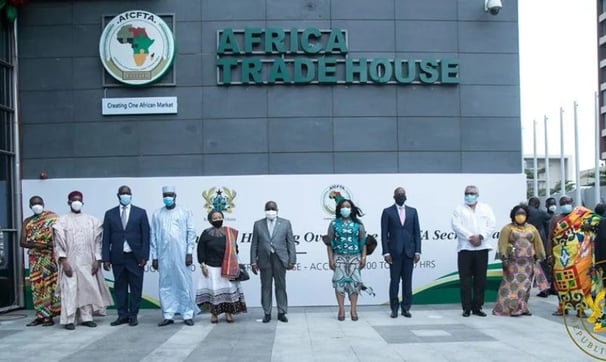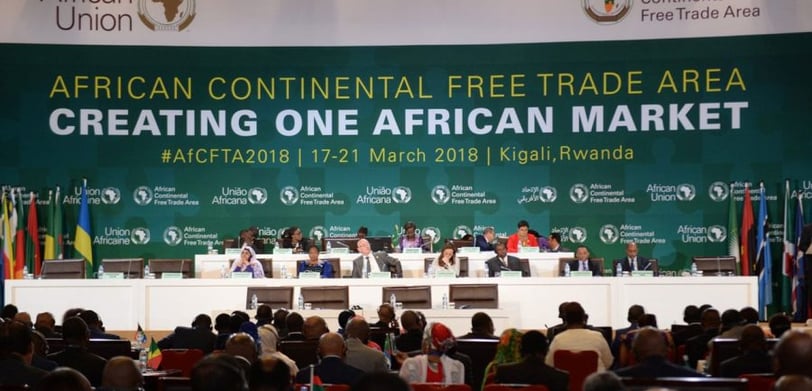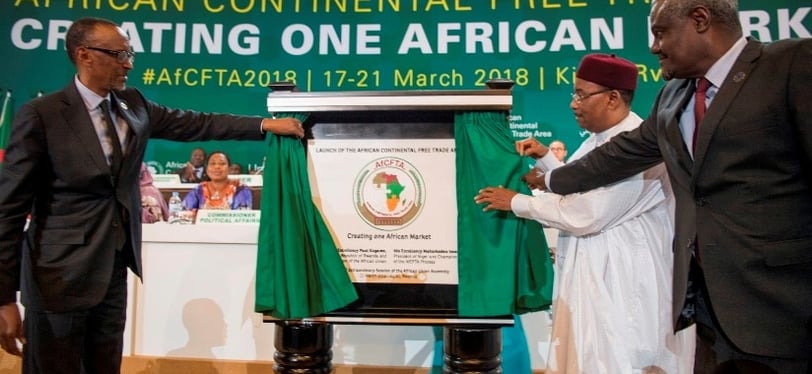The African Continental Free Trade Area (AfCFTA) Creating One African Market
AFRICA


Intra-African trade, currently at a modest 15%, is poised to skyrocket to 56% by 2030 under the AfCFTA. This surge in trade is expected to boost economic growth by an estimated 7% by 2030, create millions of jobs, reduce poverty by 30 million people, and strengthen Africa's global economic standing.
Unveiling the Promise of Economic Transformation: A Deep Dive into the African Continental Free Trade Area (AfCFTA)
The African Continental Free Trade Area (AfCFTA), a landmark agreement signed in 2018, has ignited a wave of optimism across the continent, promising to revolutionize intra-African trade and unlock Africa's vast economic potential. This ambitious initiative, the largest free trade area in the world since the establishment of the World Trade Organization, aims to dismantle trade barriers, promote economic integration, and foster a more united Africa.
A Journey Towards a Pan-African Market: Implementation and Benefits
The AfCFTA's implementation is steadily gaining momentum, with 54 of the 55 African Union (AU) member states having ratified the agreement. While challenges remain in areas such as infrastructure development and harmonizing trade regulations, the AfCFTA's potential benefits are undeniable.
Intra-African trade, currently at a modest 15%, is poised to skyrocket to 56% by 2030 under the AfCFTA. This surge in trade is expected to boost economic growth by an estimated 7% by 2030, create millions of jobs, reduce poverty by 30 million people, and strengthen Africa's global economic standing.
Navigating the AfCFTA Landscape: Rules of Origin and Tariff Schedule
To ensure fair trade and prevent abuse of the AfCFTA's benefits, the agreement establishes clear rules of origin. These rules define the minimum level of transformation required for a product to be considered as originating from an AfCFTA member country and qualify for preferential treatment.
The AfCFTA also includes a comprehensive tariff schedule, outlining the tariffs applicable to goods traded between member countries. This schedule is gradually being phased down, with the ultimate goal of achieving zero tariffs on 90% of goods traded within the AfCFTA.
Unleashing Africa's Economic Diversification: Impact on Specific Industries
The AfCFTA's impact is expected to be felt across various industries, from agriculture and manufacturing to services and technology. The agreement is poised to boost agricultural productivity by 25% by 2030, promote industrialization by 50%, and strengthen the growth of Africa's burgeoning services sector by 15%.
Specific countries and regions are also set to benefit significantly from the AfCFTA. For instance, landlocked countries will gain improved access to regional markets, while coastal nations can leverage their ports to facilitate trade across the continent.
Paving the Way for Success: Addressing Challenges and Solutions
Despite its immense promise, the AfCFTA faces certain challenges, including infrastructure gaps, non-tariff barriers, and the need for capacity building among businesses. To address these challenges, the AfCFTA Secretariat, the agreement's administrative body, is working closely with member states and development partners to implement effective solutions.
Infrastructure development is a key priority, with investments being made in roads, railways, ports, and telecommunications to facilitate seamless movement of goods and services across the continent. Non-tariff barriers, such as technical regulations and sanitary and phytosanitary measures, are also being addressed through harmonization initiatives.
To empower businesses to navigate the AfCFTA landscape, capacity-building programs are being rolled out to enhance trade skills and knowledge among entrepreneurs and business support institutions.




A New Era of African Economic Prosperity: A Collective Commitment
The AfCFTA represents a pivotal moment in Africa's history, marking a bold step towards a more integrated and prosperous continent. By removing trade barriers, fostering economic diversification, and empowering businesses, the AfCFTA has the potential to transform Africa's economic landscape and elevate the continent to a new level of global competitiveness.
As the AfCFTA journey unfolds, it is essential to remain committed to the agreement's vision of a united and prosperous Africa. By working together, African nations can unleash the full potential of the AfCFTA and create a brighter future for all Africans.
Through the AfCFTA, Africa has embarked on a transformative journey towards economic integration and prosperity. By dismantling trade barriers, fostering regional collaboration, and empowering businesses, the AfCFTA holds the promise of a brighter future for the continent. As this journey progresses, it is crucial to remain committed to the agreement's vision and work together to unlock Africa'
Watch this video to learn more abou AfCFTA
Paving the Way for Success: Challenges and Solutions
Despite its immense promise, the AfCFTA faces certain challenges, including infrastructure gaps, non-tariff barriers, and the need for capacity building among businesses. To address these challenges, the AfCFTA Secretariat, the agreement's administrative body, is working closely with member states and development partners to implement effective solutions.
Infrastructure gaps, particularly in transportation and logistics, are a major hurdle to maximizing the benefits of the AfCFTA. The AfCFTA Secretariat is working with member states to develop infrastructure development plans and secure financing for these projects.
Non-tariff barriers, such as technical standards and sanitary and phytosanitary (SPS) measures, can also hinder trade. The AfCFTA Secretariat is facilitating the harmonization of standards and regulations across member states to reduce these barriers.
Capacity building among businesses, particularly small and medium-sized enterprises (SMEs), is crucial for them to take advantage of the AfCFTA's opportunities. The AfCFTA Secretariat is providing training and support to SMEs to help them understand the agreement's rules, access financing, and develop export strategies.
A New Era of African Economic Prosperity: A Collective Commitment
The AfCFTA represents a pivotal moment in Africa's history, marking a bold step towards a more integrated and prosperous continent. By removing trade barriers, fostering economic diversification, and empowering businesses, the AfCFTA has the potential to transform Africa's economic landscape and elevate the continent to a new level of global competitiveness.
As the AfCFTA journey unfolds, it is essential to remain committed to the agreement's vision of a united and prosperous Africa. By working together, African nations can unleash the full potential of the AfCFTA and create a brighter future for all Africans.
Through the AfCFTA, Africa has embarked on a transformative journey towards economic integration and prosperity. By dismantling trade barriers, fostering regional collaboration, and empowering businesses, the AfCFTA holds the promise of a brighter future for the continent. As this journey progresses, it is crucial to remain committed to the agreement's vision and work together to unlock Africa'
Related Stories


